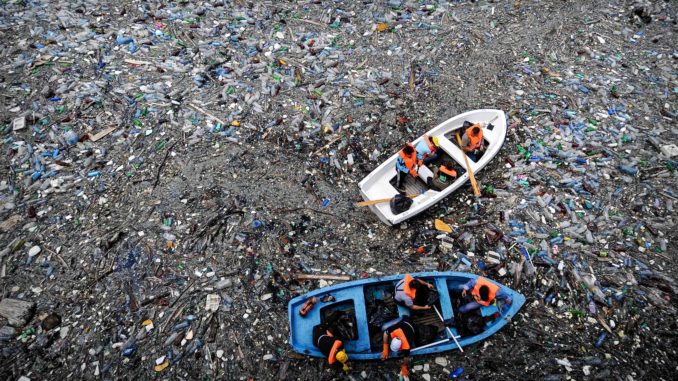
With 30 countries from Kenya to Indonesia and from Canada to Brazil now involved in the world campaign to beat pollution by countering the torrents of plastic trash that are degrading oceans and endangering the life they sustain, the UN has strengthened its massive efforts to clean up the seas, which are the Earth’s main buffer against climate change.
The 30 countries – all members of UN Environment Programme (UNEP)’s #CleanSeas campaign – account for about 40 per cent of the world’s coastlines–they are drawing up laws, establishing marine reserves, banning plastic bags and gathering up the waste choking their beaches and reefs.
The populous nations of East and South-East Asia account for most of the plastic trash entering the global ocean, UNEP reports, adding that in order to address this menace at its source, Indonesia has pledged to reduce its generation of plastic trash by 70 per cent by 2030, while the Philippines plans new laws targeting single-use plastics.
Human Addiction To Plastic Bags
Humanity’s unhealthy addiction to throwaway plastics bags is a particular target, the UN environment agency warns, while informing that countries including Kenya, France, Jordan, Madagascar and the Maldives have committed to banning plastic bags or restricting consumers to re-usable versions for which they have to pay.
“Legislation to press companies and citizens to change their wasteful habits is often part of broader government strategies to foster responsible production and consumption – a key step in the global shift toward sustainable development.”
According to UNEP, Belgium and Brazil, for instance, are both working on national action plans to curb marine pollution. Costa Rica has embarked on a five-year strategy to improve waste management that includes a push to reduce the use of plastics.
Eight Billion Tonnes of Plastic… A Year
The flow of pollution means detritus such as drink bottles and flip-flops as well as tiny plastic fragments including micro-beads used in cosmetics are concentrating in the oceans and washing up on the most remote shorelines, from deserted Pacific islets to the Arctic Circle, the UN specialised body informs.
“Humans have already dumped billions of tonnes of plastic, and we are adding it to the ocean at a rate of 8 million tonnes a year,” UNEP warns, adding that as well as endangering fish, birds and other creatures who mistake it for food or become entangled in it, plastic waste has also entered the human food chain with health consequences that are not yet fully understood.
It also harms tourist destinations and provides breeding grounds for mosquitoes carrying diseases including dengue and Zika.
The #CleanSeas campaign aims to “turn the tide on plastic” by inspiring action from governments, businesses and individuals on ocean pollution.
Pollution is the theme of the 2017 United Nations Environment Assembly, which is meeting in Nairobi, Kenya from 4 to 6 December.
The Main Buffer against Climate Change
Another UN agency reminds that while it is well known that forests, especially rainforests, are key allies in the fight against climate change as they absorb greenhouse gas emissions, oceans are the earth’s main buffer against it.
In fact, about 25 per cent of the greenhouse gases that we emit actually gets absorbed by the oceans, as does over 90 per cent of the extra heat produced by human-induced climate change, the UN Food and Agriculture Organization (FAO) reports.
“However, oceans are also one of the most affected by it.”
According to the Rome-based UN agency, human activities are resulting in acidification and increasing water temperatures that are changing our oceans and the plant and animal life within them.
More Plastic than Fish?
The UN estimates that there will be more plastic than fish in the ocean by 2050 – with over 5 trillion pieces of plastic weighing more than 260,000 tonnes currently floating in the world’s oceans. Meanwhile, harmful fishing subsidies that contribute to overfishing are estimated to be as high as 35 billion dollars.
Coral reefs and coastal environments in tropical regions, including mangroves and salt marshes, are in particular danger, warns the UN food and agriculture agency.
“These ecosystems store much of the carbon, which then remains in the oceans for hundreds of years, and are thus one of our “allies” against climate change.”
However, since the 1940s, over 30 per cent of mangroves, close to 25 per cent of salt marshes and over 30 per cent of sea-grass meadows have been lost.
“Right when we need them the most, we are losing these crucial ecosystems.”
Baher Kamal is Senior Advisor to IPS Director General on Africa & the Middle East. He is an Egyptian-born, Spanish-national, secular journalist, with over 43 years of experience. Since the late 70s, he specialised in all development related issues, as well as international politics. He also worked as Senior Information Expert for the Euro-Mediterranean Partnership at the European Commission in Brussels, and as the first-ever Information Officer and Spokesperson at UNEP’s Mediterranean Action Plan in Athens. Kamal speaks Spanish, Arabic, English and Italian.
